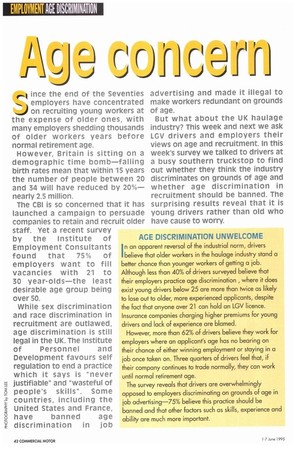I \ 7 Can ( ATLI
Page 54

If you've noticed an error in this article please click here to report it so we can fix it.
ince the end of the Seventies employers have concentrated on recruiting young workers at the expense of older ones, with many employers shedding thousands of older workers years before normal retirement age.
However, Britain is sitting on a demographic time bomb—falling birth rates mean that within 15 years the number of people between 20 and 34 will have reduced by 20%— nearly 2.5 million.
The CBI is so concerned that it has launched a campaign to persuade companies to retain and recruit older staff. Yet a recent survey by the Institute of Employment Consultants found that 75% of employers want to fill vacancies with 21 to 30 year-olds—the least desirable age group being over 50.
While sex discrimination and race discrimination in recruitment are outlawed, age discrimination is still legal in the UK. The Institute of Personnel and Development favours self regulation to end a practice which it says is "never justifiable" and "wasteful of
o people's skills". Some countries, including the United States and France,
have banned age discrimination in job advertising and made it illegal to make workers redundant on grounds of age.
But what about the UK haulage industry? This week and next we ask LGV drivers and employers their views on age and recruitment. In this week's survey we talked to drivers at a busy southern truckstop to find out whether they think the industry discriminates on grounds of age and whether age discrimination in recruitment should be banned. The surprising results reveal that it is young drivers rather than old who have cause to worry.








































































































